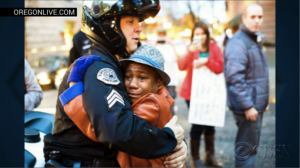Guest Post: The Eucharistic Call to Active Nonviolence in a Wounded World
For this week’s post, we would like to feature an essay by IPS student Charissa Qiu. This past fall she wrote a reflection on the Eucharist and the call to justice and solidarity. In light of current world events, her words below help us remember what our pastoral response should be in times of trouble and controversy.
The Eucharistic Call to Active Nonviolence in a Wounded World
There is no denying that the historical Jesus was a controversial figure in his time – he ate at the same table with sinners; he touched lepers; he performed miracles on the Sabbath, and he challenged the status quo and the authority of those in power in his society. The Sermon on the Mount in Matthew’s Gospel, especially in Matthew 5: 38-42, illustrates Jesus’ creative nonviolence clearly – responding to violence and injustice not with retaliation, but rather, to bring the injustice to light by finding creative ways to reveal it and have it speak for itself.
The restorative and reconciliatory justice of God that we are called to through partaking in the Eucharist is very different from the retributory justice of the world. The Eucharist calls us to right relationship and unity, which calls us not to segregation and retaliation, but rather, to respond with truth and love. Martin Luther King Jr. once said, “Darkness cannot drive out darkness; only light can do that. Hate cannot drive out hate; only love can do that.” There has been a lot of attention in the media lately surrounding two cases of white police violence against black unarmed men, and the grand jury’s decision not to indict the police officers. That has brought up a lot of various emotional responses of the public, with various people supporting either side. There have been riots to express outrage, forums for people to express and discuss feelings and opinions – people have felt the need to express themselves, and rightfully so. In the middle of all this chaos and emotion, a 12-year-old boy by the name of Devonte Hart (image below) chose to stand out holding a sign that read “Free Hugs,” and that courage and expression of love brought a moment of peace – a tiny glimpse of the Kingdom of God. It is when we start to see the humanity within each other that we share that we begin to stand together in solidarity, in the celebration of the Eucharist, and live into the Kingdom of God.
We can acknowledge that we live in a world right now laden with violence and injustice, one that is filled with pain and woundedness. We are suspicious and afraid of “the other,” so we respond by distancing ourselves even more from what we are unfamiliar with, and continue to live in fear. The call of the Eucharist is to vulnerability, to openness, to transformation, and ultimately, to relationship. We cannot overcome our fear of the unknown through distancing ourselves – we need to overcome our fear by getting in touch with the unknown and “the other.” Jesus taught and lived out active nonviolence, and it is important to clarify here that nonviolence is not the same thing as passivity. To “turn the other cheek” does not mean to allow abuse to continue – in turning the other cheek, we are forcing the other person to slap us with their open hand (the left hand was only used for unclean purposes in Jesus’ time and so would not be used) which is a statement of equality – it is demanding to be treated fairly and equally; an act of active nonviolence.
As we accept the reality of our wounded world, we need to, at the same time, go beyond that reality and ground ourselves in hope, and with faith that love is stronger and more sustainable than hatred. That is the call of the Eucharist – into the darkness, but also into the light. Jesus hung on the cross between the tensions of the world and the Kingdom of God, and there was darkness, but after patiently sitting in the darkness and allowing it to transform us, there will be light.
Join the conversation by following @BrianSchmisek on Twitter and @LoyolaIPS on Instagram! Also, network with the Loyola Chicago IPS community on LinkedIn.
